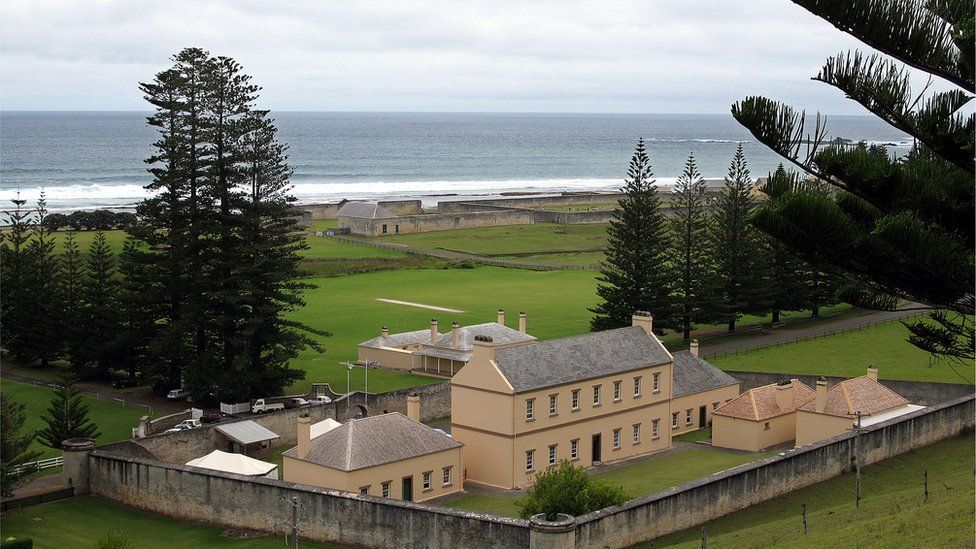Does Norfolk 'mutiny' disguise bounty of privilege?
- Published

In 1789 the crew of HMS Bounty took control of the ship and set their captain adrift. The incident was made famous in the film Mutiny on the Bounty. Now the descendants of the mutineers on Norfolk Island have been accused of invoking the romance of the Bounty story to protect their own interests, writes Kathy Marks.
They portray themselves as modern-day mutineers, standing up to their tyrannical overlords just as Fletcher Christian and his fellow Bounty sailors resisted Captain William Bligh.
But critics say the Norfolk Islanders opposed to Australia taking over their homeland really fear that they will lose the power and privileges they have enjoyed for generations.
The 1,700-strong population of Norfolk, an external territory of Australia in the South Pacific, is deeply divided over the federal government's plans to run the formerly self-governing island from 1 July.
Once a tax haven and booming tourism destination, Norfolk - located 1,600km north-east of Sydney - has in recent years become dependent on cash from the mainland, receiving more than $30m in budget deficit funding to cover public expenditure, infrastructure upgrades and other costs.
Now it is to be absorbed into the income tax and welfare system - a long overdue move, according to the island's administrator, Gary Hardgrave, who says half of residents are on or below the poverty line.
Mr Hardgrave is brushing off calls to quit from those locals who trace their ancestry back to Pitcairn Island, where the mutineers fled with a group of Tahitian women after seizing the Bounty in 1789.
'Blue-blooded' resistance
Although long since outnumbered by mainland Australians and other "outsiders", these original Norfolkers, identified by some as "the bluebloods", and whose forebears migrated to the former British penal colony in the mid-19th Century after outgrowing Pitcairn - dominate politics and public debate.
Last year, after Australia abolished the nine-member Legislative Assembly which had run the island for 35 years, the "blue bloods" founded a protest group, Norfolk Island People for Democracy.
Last month, they presented a petition to the United Nations seeking recognition of their right to self-determination.
But while their views have made headlines, little has been heard from those who believe Norfolk has much to gain from closer integration with Australia.
"Just like in any small town, if you don't go along with what the pack's saying, the pack turns on you and savages you," Mr Hardgrave says.
Among the few unafraid to speak out is Mike King, a hotelier and former politician who has lived on the island for 45 years. He welcomes Canberra's intervention and expects capital investment in Norfolk's decaying infrastructure - potentially amounting to A$35 million (£17.4m) - to revitalise a long-depressed economy.
Mr King brands self-government an "out-and-out failure" - a view rejected by Andre Nobbs, a former chief minister. Mr Nobbs says locals are "distressed, disturbed and disenchanted" by Australia's actions, and he accuses Canberra of rewriting laws to "remove recognition of the Pitcairn connectivity and culture and heritage".
He also insists that a "clear majority" of islanders reject reform, pointing to the 68% of people who voted yes in a referendum about Norfolk's future last year. However, others say the wording of the referendum question was ambiguous and designed to guarantee an affirmative result.
'Bully' culture
For decades, the island - with its golden beaches, Georgian stone buildings and hillsides peppered with Norfolk Island pines - prospered from tourism. But competition from cheaper Pacific destinations has slashed visitor numbers, sent businesses bankrupt and prompted up to one-fifth of the population to leave.
Some locals are convinced that Norfolk could survive on its own, with income from fisheries and offshore banking. But Mr Nobbs says Australia has "obstructed our every effort at income generation", including growing and exporting medicinal cannabis.
Other islanders, though, blame the parlous situation on chronic financial mismanagement and a bloated public service. About 50 posts are to be cut, but official forecasts suggest more jobs will be created than lost on Norfolk, thanks to capital projects such as a A$13 million refurbishment of the pier to facilitate cruise ship visits.
What really irks the anti-reformists, many believe, is that their dominant position in public life is under threat, along with the accompanying perks, such as dispensing jobs and favours to family members.
It is a position which Norfolkers with Pitcairn roots have jealously guarded for decades, allegedly with the help of unsavoury tactics. Dissenters have had their fences cut and 44-gallon drums of cement dumped in their driveways.
"I don't like bullying, and that's what I see on Norfolk Island pretty constantly - a culture of scaring and bullying people who don't agree with you," says Mr Hardgrave.
Now the romance of the Bounty story is once more being invoked in a last-ditch effort to keep Canberra at bay. The word "mutiny" has been daubed on the wall of the convict-era prison, directly opposite Mr Hardgrave's office in Kingston, the administrative centre.
Mr King acknowledges that the social divisions are hurting the community. "Families have been split, friendships have been shattered, and I don't think things will heal in my lifetime," he says. "It's a terrible shame. But the other side of the story has got to be told."
UPDATE - 1 June 2016: This article was amended to clarify details about Norfolk Island's finances and population.
- Published19 March 2015
- Published1 February 2007